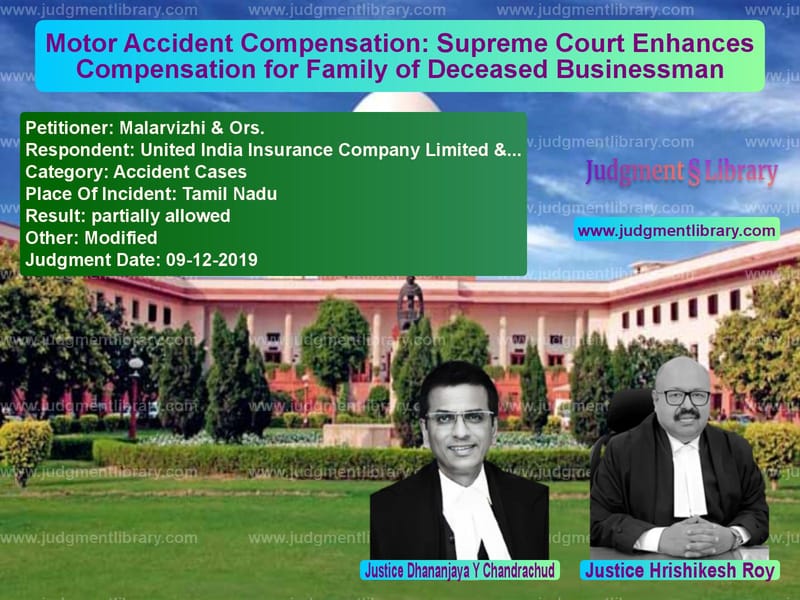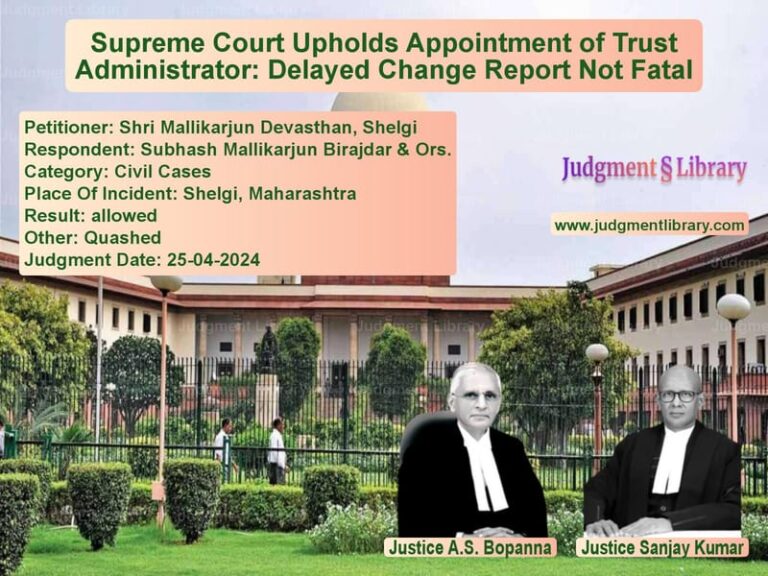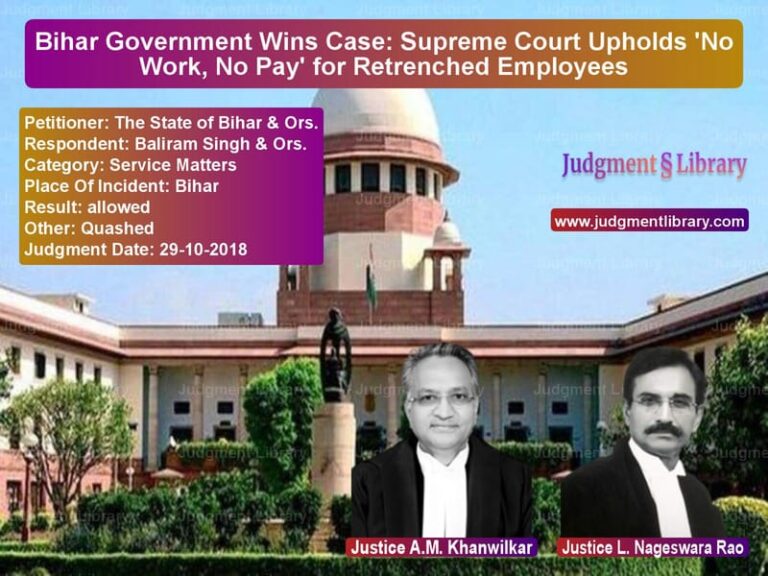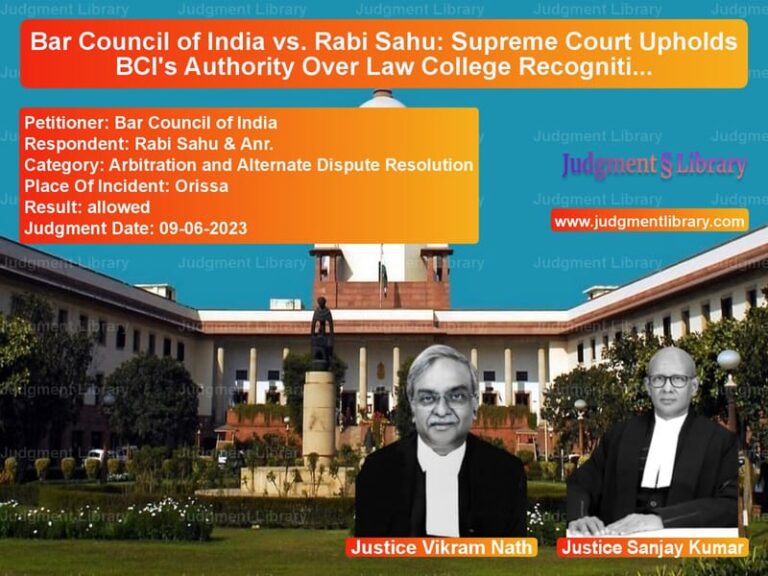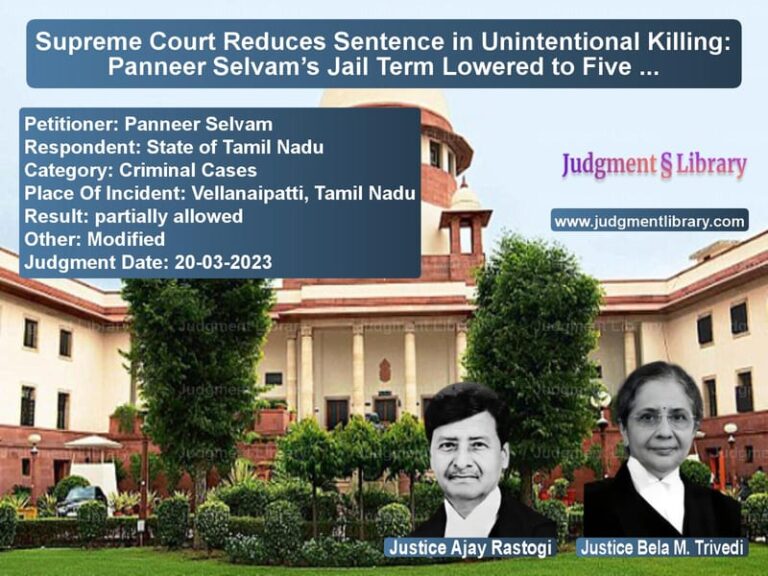Motor Accident Compensation: Supreme Court Enhances Compensation for Family of Deceased Businessman
The case of Malarvizhi & Ors. vs. United India Insurance Company Limited & Anr. is a significant Supreme Court ruling concerning motor accident compensation. The Court examined whether the income tax returns of the deceased should be the primary determinant for compensation and reassessed the amount awarded by the lower courts.
Background of the Case
The case arose from a motor accident that took place on May 25, 2001. The deceased, Aranganathan, was traveling in an Ambassador car (TN 23 A 7549) when a Tata Sierra car (TN 20 Z 1613) coming from the opposite direction collided with his vehicle. The accident caused severe injuries, leading to his death.
The claimants, comprising his wife and four daughters, filed a claim under Section 166 of the Motor Vehicles Act, 1988, seeking compensation of Rs. 99,90,000.
Key Legal Issues
The Supreme Court had to decide:
- Whether the High Court was correct in reducing the compensation awarded by the Tribunal.
- Whether the income tax returns of the deceased should be the primary determinant of his income.
- Whether deductions on depreciation and property sales should be considered while computing compensation.
- Whether future prospects and other conventional heads should be reconsidered.
Tribunal’s Award
The Motor Accident Claims Tribunal (MACT), Ranipet, passed an award on July 11, 2012, granting compensation of Rs. 59,04,000, with interest at 7.5% per annum from the date of the claim petition till realization.
The Tribunal assessed the deceased’s income as follows:
- Agricultural income: Rs. 3,40,708 per annum
- Business income: Rs. 89,590 per annum
- Real estate and contract business: Rs. 30,000 per annum
- Total assessed income: Rs. 4,60,298
A 30% addition was made towards future prospects, bringing the total annual income to Rs. 5,98,387. After deducting 1/4th towards personal expenses, the Tribunal applied a multiplier of 13 and arrived at a compensation of Rs. 58,34,277. Additionally, Rs. 70,000 was awarded for funeral expenses, loss of consortium, and loss of love and affection.
High Court’s Reduction of Compensation
The Madras High Court partially allowed the appeal filed by the insurance company. In its judgment dated July 20, 2018, the High Court reduced the compensation from Rs. 59,04,000 to Rs. 33,55,000. The court concluded that:
- The deceased’s income should be determined based on the highest income tax return from 1995-2001, which was Rs. 2,09,211 for 1997-98.
- Adding Rs. 40,000 for future prospects, the total income was Rs. 2,50,000 per annum.
- The court applied a multiplier of 13 without deducting personal expenses, resulting in Rs. 32,50,000 for loss of dependency.
- Adding Rs. 1,05,000 under conventional heads, the final award was Rs. 33,55,000.
Supreme Court’s Observations and Ruling
The Supreme Court bench, comprising Dr. Dhananjaya Y Chandrachud and Hrishikesh Roy, reassessed the case and ruled in favor of the claimants.
1. Income Tax Returns as the Primary Basis
The Court upheld that income tax returns should be the primary determinant of the deceased’s income:
“The income tax return is a statutory document on which reliance may be placed to determine the annual income of the deceased.”
The Court used the highest declared income of Rs. 2,11,131 from 1997-98 and added Rs. 1,04,987 from prepaid license fees, making the net income Rs. 3,16,118.
2. Future Prospects
Following the Constitution Bench ruling in National Insurance Co. Ltd. vs. Pranay Sethi, the Court applied a 25% increase for future prospects:
- 25% of Rs. 3,16,118 = Rs. 79,029
- Total annual income = Rs. 3,95,147
3. Deductions for Personal Expenses
The Court deducted 1/5th of the income for personal expenses, considering the deceased had five dependents:
- Deduction = Rs. 79,029
- Net annual income = Rs. 3,16,118
4. Multiplier and Final Compensation
Applying a multiplier of 13 (as per Sarla Verma vs. DTC):
- Loss of dependency = Rs. 41,09,534
- Funeral expenses = Rs. 15,000
- Loss of estate = Rs. 15,000
- Loss of consortium = Rs. 40,000
- Loss of love and affection = Rs. 50,000
- Total compensation = Rs. 42,29,534
Final Judgment
The Supreme Court enhanced the compensation:
“The total compensation payable to the appellants is Rs. 42,29,534 with interest at 9% per annum from the date of filing of the application till payment.”
Implications of the Judgment
This ruling has significant implications for motor accident compensation cases:
- Income Tax Returns as the Basis: Courts should rely on tax returns rather than estimates.
- Future Prospects Must Be Included: The ruling follows Pranay Sethi, ensuring higher compensation.
- Proper Deduction of Personal Expenses: The judgment aligns with Sarla Verma guidelines.
- Ensuring Just Compensation: Claimants must receive fair amounts based on documented income.
Conclusion
The Supreme Court’s ruling in Malarvizhi & Ors. vs. United India Insurance Co. ensures fair compensation for accident victims. By reaffirming reliance on tax returns and standardized multipliers, the judgment strengthens principles of justice in motor accident claims.
Petitioner Name: Malarvizhi & Ors..Respondent Name: United India Insurance Company Limited & Anr..Judgment By: Justice Dhananjaya Y Chandrachud, Justice Hrishikesh Roy.Place Of Incident: Tamil Nadu.Judgment Date: 09-12-2019.
Don’t miss out on the full details! Download the complete judgment in PDF format below and gain valuable insights instantly!
Download Judgment: Malarvizhi & Ors. vs United India Insuran Supreme Court of India Judgment Dated 09-12-2019.pdf
Direct Downlaod Judgment: Direct downlaod this Judgment
See all petitions in Compensation Disputes
See all petitions in Motor Vehicle Act
See all petitions in Negligence Claims
See all petitions in Judgment by Dhananjaya Y Chandrachud
See all petitions in Judgment by Hrishikesh Roy
See all petitions in partially allowed
See all petitions in Modified
See all petitions in supreme court of India judgments December 2019
See all petitions in 2019 judgments
See all posts in Accident Cases Category
See all allowed petitions in Accident Cases Category
See all Dismissed petitions in Accident Cases Category
See all partially allowed petitions in Accident Cases Category

